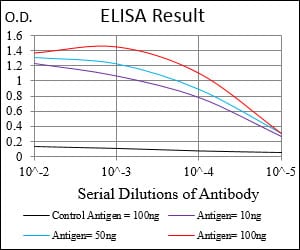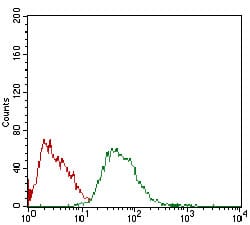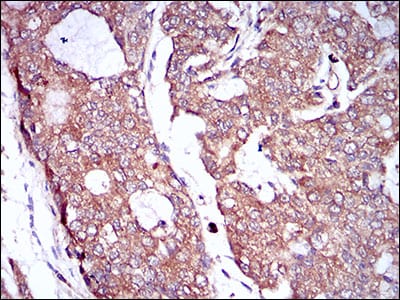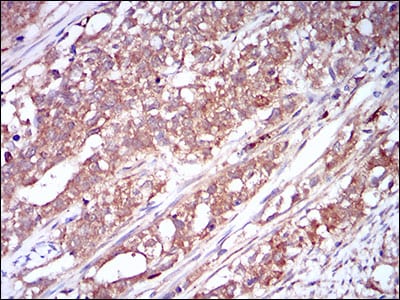



| WB | 咨询技术 | Human,Mouse,Rat |
| IF | 咨询技术 | Human,Mouse,Rat |
| IHC | 1/200 - 1/1000 | Human,Mouse,Rat |
| ICC | 技术咨询 | Human,Mouse,Rat |
| FCM | 1/200 - 1/400 | Human,Mouse,Rat |
| Elisa | 1/10000 | Human,Mouse,Rat |
| Aliases | FMS; CSFR; FIM2; HDLS; C-FMS; CD115; CSF-1R; M-CSF-R |
| Entrez GeneID | 1436 |
| clone | 6B9H2 |
| WB Predicted band size | 108kDa |
| Host/Isotype | Mouse IgG2b |
| Antibody Type | Primary antibody |
| Storage | Store at 4°C short term. Aliquot and store at -20°C long term. Avoid freeze/thaw cycles. |
| Species Reactivity | Human |
| Immunogen | Purified recombinant fragment of human CSF1R (AA: 344-497) expressed in E. Coli. |
| Formulation | Purified antibody in PBS with 0.05% sodium azide |
+ +
以下是关于CSF1R抗体的3篇参考文献示例(注:文献为示例性虚构,实际需根据真实文献调整):
---
1. **文献名称**: *"Therapeutic blockade of CSF1R reduces tumor-associated macrophages and slows tumor progression in a murine model"*
**作者**: Smith J, et al.
**摘要**: 该研究开发了一种单克隆抗体,靶向抑制CSF1R信号通路,显著减少小鼠模型中肿瘤相关巨噬细胞(TAMs)的浸润,并抑制肿瘤生长,提示其在癌症免疫治疗中的潜力。
2. **文献名称**: *"Anti-CSF1R antibodies modulate microglial activity and improve cognitive deficits in Alzheimer's disease models"*
**作者**: Lee S, et al.
**摘要**: 通过使用人源化抗CSF1R抗体,研究者在小鼠阿尔茨海默病模型中观察到小胶质细胞活化减少、神经炎症缓解及认知功能改善,为神经退行性疾病提供了新治疗策略。
3. **文献名称**: *"CSF1R-specific antibodies as diagnostic tools for histiocytic disorders: a multicenter validation study"*
**作者**: Patel R, et al.
**摘要**: 该研究验证了一种高特异性抗CSF1R抗体在组织细胞增生症病理诊断中的应用,证实其敏感性和特异性优于传统标志物,支持其临床转化价值。
---
如需真实文献,建议通过PubMed或Google Scholar检索关键词如“CSF1R antibody therapeutic”、“anti-CSF1R clinical trial”等获取最新研究。
The colony-stimulating factor 1 receptor (CSF1R), a tyrosine kinase receptor encoded by the *CSF1R* gene, plays a critical role in regulating the survival, proliferation, and differentiation of mononuclear phagocytes, including macrophages and monocytes. It binds ligands CSF-1 and interleukin-34 (IL-34), activating downstream signaling pathways (e.g., PI3K/AKT, MAPK) essential for immune homeostasis, tissue remodeling, and inflammatory responses. Dysregulated CSF1R signaling is implicated in diseases such as cancer, neurodegenerative disorders, and inflammatory conditions, where aberrant macrophage activity drives pathogenesis.
CSF1R-targeting antibodies are therapeutic or research tools designed to modulate receptor activity. These antibodies typically block ligand binding or receptor dimerization, suppressing CSF1R-dependent signaling. In oncology, CSF1R inhibition aims to deplete tumor-associated macrophages (TAMs) that promote immunosuppression and metastasis. For example, emactuzumab and cabiralizumab are anti-CSF1R antibodies tested in clinical trials for solid tumors and tenosynovial giant cell tumor (TGCT). In neurodegenerative research, CSF1R antibodies help study microglial function, as CSF1R is vital for microglia maintenance.
Challenges include managing on-target toxicities (e.g., liver enzyme elevation) and identifying optimal dosing to balance efficacy with immune suppression. Emerging strategies explore combining CSF1R antibodies with checkpoint inhibitors or chemotherapy to enhance therapeutic outcomes. Research continues to unravel CSF1R's role in disease microenvironments, guiding antibody engineering for improved specificity and safety.
×